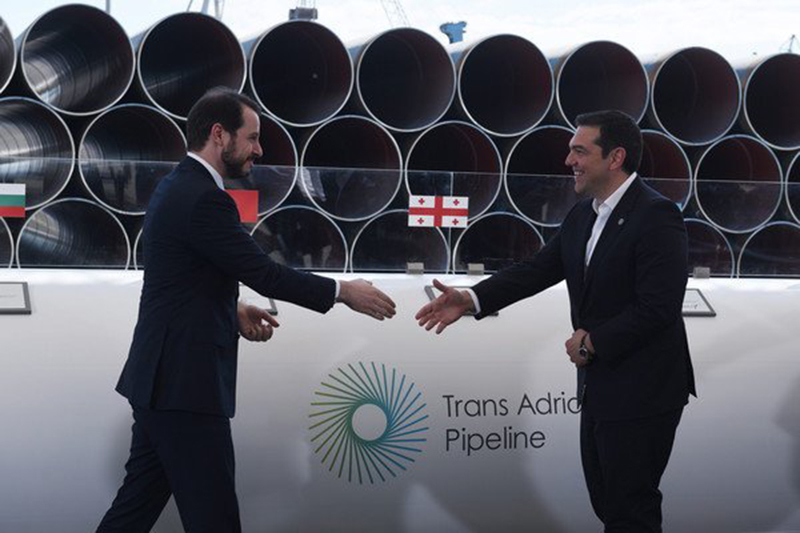
Originally appeared at DWN, translated by John T. Sumner exclusively for SouthFront
The Euro states are about to transfer 10.3 billion Euros to Greece, so that the country can service its ECB debits. The agreement has energy policy reasons in particular: In Greece, the construction of a new pipeline has already begun. Washington does not want to see the country´s stability compromised, because this pipeline is of great significance for Europe’s future energy supply.
On Tuesday night the Euro zone finance ministers decided in favor of a new disbursement for Greece. After seven hours of consultations, a payment of 10.3 billion Euros, to be cashed out in two tranches until September, has been approved.
A first tranche of 7.5 billion Euro shall be paid in June. It should be used to handle due payments towards the European Central Bank (ECB) and to pay Athens’s arrears towards Greek creditors as well.
In September, a further payment of 2.8 billion would be made. The deal came after Germany in principle had agreed to a debt restructuring: The debts from the IMF loans are to be passed on to the Euro-taxpayers. In return, a formula has been found, intended to convey the impression as if Greece’s debt sustainability would be given in case of a hypothetical primary surplus. This allows the IMF to stay on board. In other words, the IMF in principle may not support any failed state – apart from Ukraine. The new formula is intended to give the impression that Greece is not bankrupt. At the same time, Germany agreed to take over the recent IMF loan after the federal elections. Already the previous credit was amortized to the IWF and the ECB by the European taxpayers.
Traditionally, the Greek population does not gain from this “aid funds” anyway. Just recently, a study has confirmed that the first Greek bailout almost exclusively represented a simple bank bailout. After the previous financial rescue, payments of the European taxpayers are now forwarded to the official creditors, the IMF and the ECB, again.
The reason for the emerging new agreement is the geopolitical importance of Greece. The US insists on Greece to remain in the Euro for reasons of stability of the country. The government in Athens was forced to adopt a new, tough austerity program on Sunday.
At the same time Greece has begun building a 550-kilometer section of the Trans Adriatic Pipeline (TAP). TAP is a project of a European consortium whose shareholders are BP (20%), SOCAR (20%), Snam (20%), Fluxys (19%), Enagas (16%) and Axpo (5%). The first sod was turned by the Greek Prime Minister, Alexis Tsipras, last week. The inauguration ceremony was held in Thessaloniki. “TAP is one of the largest foreign projects of direct investment, to be realized in Greece. The Greek economy needs these jobs quite desperately, ” oilprice.org is citing Tsipras. Greece hopes that the TAP, which has a project volume of EUR 1.5 billion, will create around 8,000 new jobs.
The TAP is to be taken into operation in 2019. The pipeline will transport energy from the gas field Shah Deniz 2 in Azerbaijan to Italy via Georgia, Turkey, Greece and Albania. The section from Azerbaijan to the Turkish-Greek border is covered by the Trans Anatolian Pipeline (TANAP). However, the TAP in fact runs from the Greek city of Komotini right to Puglia in Italy. The TANAP has a length of 1,850 kilometers and the TAP has a length of 870 kilometers. Greece is an important country of NATO’s southern flank. Therefore, the Obama administration by all means wants to prevent a withdrawal of the country from the Euro. The government in Athens knows that the Greek bailout is depending on the goodwill of Americans who are influential in the IMF and in Brussels.
From US-American perspective the TAP and TANAP are two important projects in terms of energy policy, that were in direct competition with the Russian pipeline, Turkish Stream, previously. Since the termination of the buildup of Turkish Stream, the US project remains the only alternative for European gas supply along the Southern Corridor. Finally, this will empower the US, to break Russia´s de facto monopoly of European gas supply.
In addition, US fracking producers are pushing into the EU market and are expanding their position in order to displace Russia from the market as much as possible by this step. In April, the US have supplied gas to Europe for the first time. A US tanker landed in Portugal then.




No so sure the Russians will be that concerned as china, india and the rest of asia will become key customers of Russian gas and oil. Much bigger market than Europe.
Russia has a very EU-centric energy business. Even if the Asia is able and ready to buy enough from Russia, there is no infrastructure for this.
By profession I’m a pipeline engineer for a major international corporation, and I assure you that oil, and gas pipelines can be built, depending on the terrain, very rapidly. If Russia/China fully committed to the necessary pipelines they could be constructed in 3 years or less.
Yes, it isn’t a “big” problem. But even if a pipeline is built, it isn’t the whole thing. Check the faith of the new Russian pipeline to China.
I only do pipelines, I don’t do politics.
The gas fields are only capable of supplying 5%(25BCM) of Europes gas needs(490BCM).
This project has been around for a long time, but never got off the ground because the developments costs could not be recovered in a reasonable period of time.
This is just a way for the US to get the EU to pay the development costs for US/UK(BP) business interests, AND get Azerbaijan to allow a US naval base on the Caspian sea.